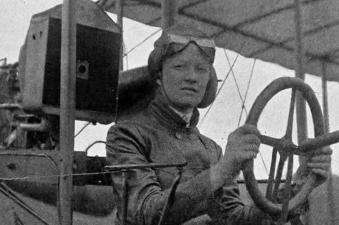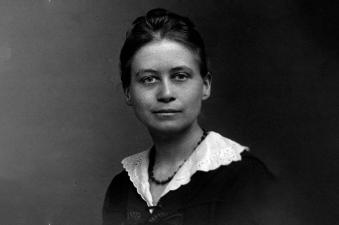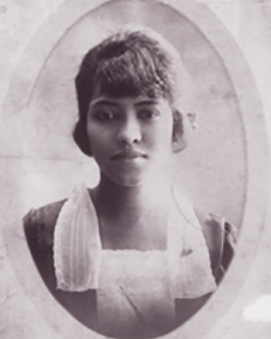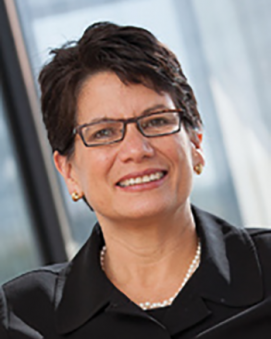-
About
- Departments & Offices
-
Academics
- Physician Assistant
- Special Master’s (MBS)
-
Admissions & Financial Aid
- Tuition & Fees
-
Student Experience
-
- Student Resources by Program
- Academic & Student Support
- Wellness & Wellbeing
- Student Life
- Events & Traditions
-
-
Research
- Research Labs & Centers
- Tufts University-Tufts Medicine Research Enterprise
-
Local & Global Engagement
- Global Health Programs
- Community Engagement
Celebrating Women’s History Month
Learn about some of Tufts University School of Medicine's amazing trailblazing alumni and faculty.
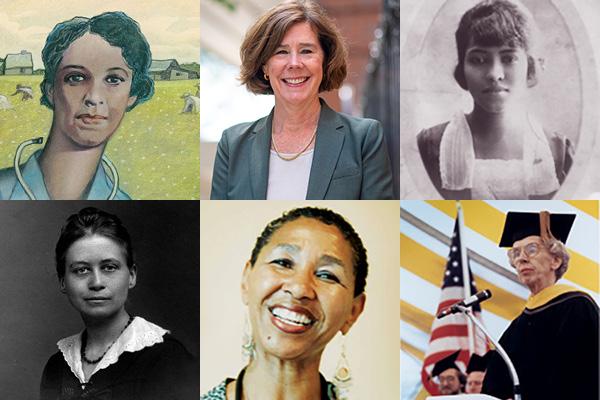
Years before Amelia Earhart took flight, Bessica Medlar Raiche, M1903, took to the skies in a solo flight, making her the first American female aviator. And that's not her only aviation accomplishment. She and her husband built that plane from scratch. And later in life Raiche went on to become one of the country's first female doctors specializing in obstetrics and gynecology.
Helen Boucher, MD, an expert in infectious disease and antimicrobial resistance, was named dean of Tufts University School of Medicine in October 2022. She is the first woman to lead the School of Medicine in its 129-year history, with this appointment Boucher builds on a 20-year career at Tufts as a clinician, professor, administrator, and researcher.
As a faculty member at Tufts University School of Medicine and Tufts University School of Dental Medicine for more than 36 years, Anna Quincy Churchill, M1917, devoted her career to bringing a sense of wonder to her classes. She was known for her love of anatomy and her trailblazing career as a woman in academic medicine, but perhaps even more for the support she gave her students, both as a mentor and a benefactor.
Jane F. Desforges, M45, was a renowned hematologist and an authority on anemia, specifically sickle-cell disease and Hodgkin’s lymphoma. She published numerous papers on her findings, and hematologists around the world solicited her expert opinion to solve challenging cases.
Ruth Marguerite Easterling, M1921, was born in Georgetown, South Carolina on February 17, 1898, but was raised in Cambridge, Massachusetts. She received her undergraduate degree at Jackson College, a women's affiliate college of Tufts University in Medford, where she studied premedical sciences. Easterling was one of the first black women to be admitted to Tufts University School of Medicine in 1917. One of Easterling's accomplishments as a pathologist was to work with an African American physician named William Augustus Hinton to develop the Hinton test for syphilis. In 1979, the Progressive Alliance of Minority Students organization at Tufts School of Medicine established the Dr. Ruth M. Easterling Scholarship which provides minority students with financial assistance.
Gloria White-Hammond, M76, H06, is the founder of the church-based creative writing and mentoring ministry, "Do the Write thing" for high-risk adolescent females. In 2002, she co-founded My Sister's Keeper, a women-led humanitarian and human rights initiative that partners with diverse Sudanese women in their efforts toward reconciliation and reconstruction of their communities.
Katherine Luzuriaga, M84, is an immunologist who was named one of Time magazine’s 100 most influential people in the world for 2013. She and her team — including pediatrician Hannah Gay of the University of Mississippi and virologist Deborah Persaud of Johns Hopkins Children’s Center — functionally cured a newborn of AIDS by giving anti-HIV drugs to the infant. The child, now two-and-a-half years old, no longer requires medication and shows no signs of HIV.
Dorothy Boulding Ferebee, M1924, was one of the most notable early graduates of Tufts School of Medicine. Raised in a solidly middle-class family on Boston’s Beacon Hill and educated at Simmons College before entering Tufts, Ferebee rose to become one of the best-known African-American women in the U.S. by the mid-20th century. Reaching neglected populations through medicine was her life’s recurring theme, best evidenced in the case of the Mississippi Health Project, which she pursued every summer between 1935 and 1941.
